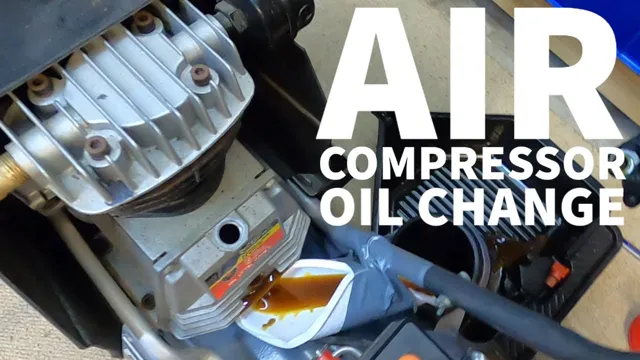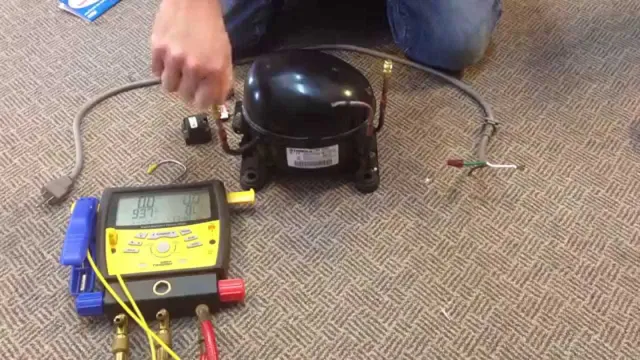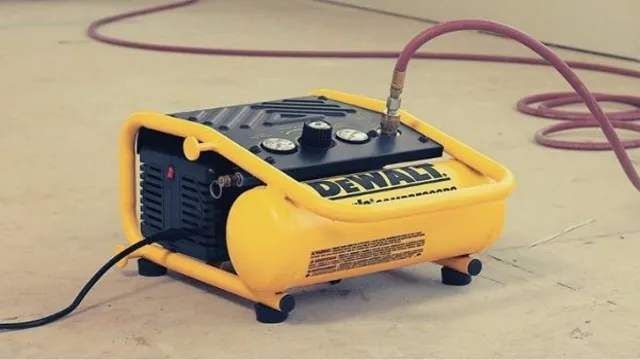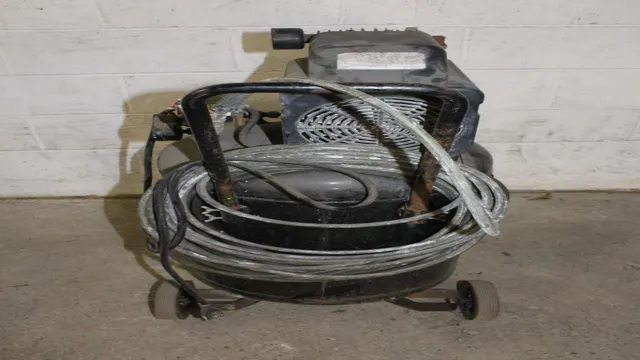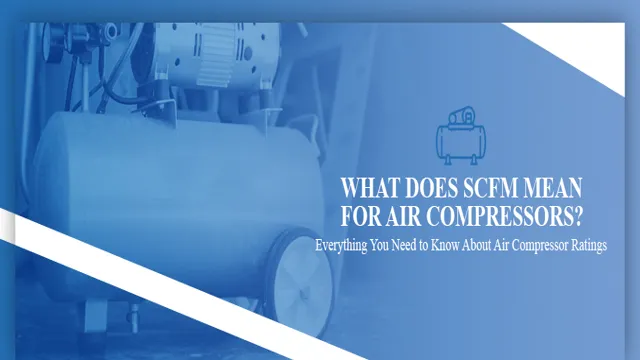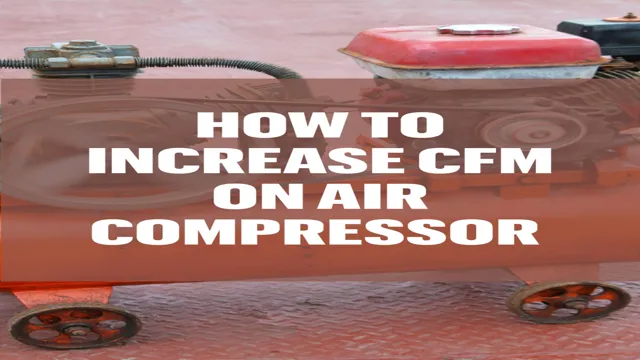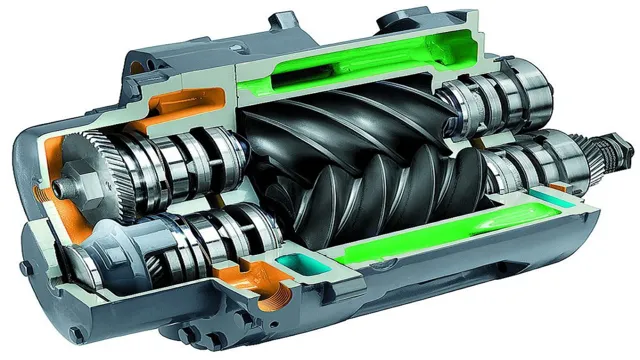Should You Drain Air Compressor After Every Use? Find Out the Importance of Draining to Avoid Damage and Maintenance.
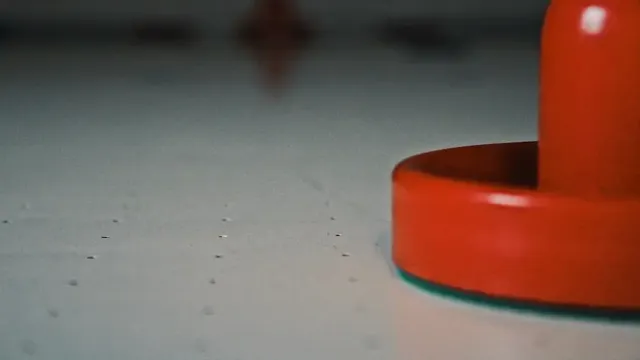
Have you ever wondered if you should drain your air compressor after every use or not? It’s a question that many air compressor owners struggle with. On one hand, draining your compressor can help prevent rust and moisture buildup, which can ultimately extend the life of your equipment. On the other hand, constantly draining your compressor can be a hassle, especially if you use it frequently.
Just like changing the oil on your car, draining your air compressor is an important maintenance task that should not be overlooked. Moisture can accumulate inside the tank, which can lead to rust and corrosion over time. This not only shortens the life of your compressor but can also impact its performance, causing it to run less efficiently.
However, draining your compressor every time you use it may not be necessary. If you use your compressor infrequently, draining it once a month should be sufficient. This will help remove any moisture buildup without becoming too much of a hassle.
Ultimately, the decision to drain your air compressor after every use or not will depend on how frequently you use it and how much moisture buildup you typically experience. Just like any other piece of equipment, proper maintenance is crucial to ensuring you get the most out of your air compressor. So, whether you choose to drain it every time or simply on a regular schedule, make sure you include this important task in your maintenance routine.
What is an air compressor?
Air compressors are machines used to convert power into compressed air, which can be used for various applications like powering air tools, filling up tires, and inflating balloons. However, after using an air compressor, it is essential to drain the tank to remove any moisture or condensation that may have accumulated inside. This is especially important if the compressor will not be used for an extended period, as moisture can lead to rust and corrosion.
In addition, regular draining can extend the life of the compressor and ensure optimal performance. So, yes, you should drain air compressor after every use to prevent any potential damage and guarantee a longer lifespan.
– Definition
An air compressor is a device that compresses air and releases it under pressure, making it a valuable tool in various industries. It works by drawing in air and compressing it using a motor or engine. The compressed air is then stored in a tank or released through a hose for various applications, such as powering pneumatic tools or inflating tires.
Air compressors come in various types and sizes, including reciprocating, rotary screw, and centrifugal compressors. The type of compressor chosen depends on the intended use, the required pressure, and the volume of air needed. With its versatility and efficiency, an air compressor is a valuable asset for anyone in need of compressed air for their projects or business.
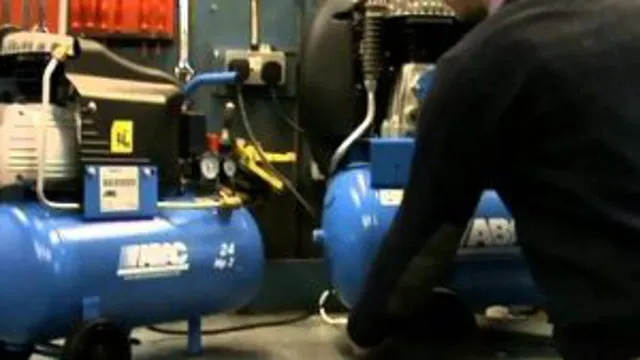
– Types of air compressors
An air compressor is a machine that converts power into energy stored in pressurized air. This energy can be used for various tasks, including powering pneumatic tools, inflating tires, and cleaning equipment. There are several types of air compressors, each with its unique features and applications.
For instance, reciprocating air compressors use a piston to compress air, while rotary screw compressors use a pair of interlocking helical screws to compress air. Other types of air compressors include centrifugal compressors, which use high-speed rotation to compress air, and axial compressors, which compress air through a series of rotating blades. Each type of compressor has its strengths and limitations, making it crucial to choose the right one for your particular needs.
Overall, air compressors are versatile machines that provide a convenient and efficient way to power a wide range of tools and equipment.
Why do you need to drain your air compressor?
As a responsible air compressor owner, you may be wondering whether you should drain your air compressor after every use. The answer is that it depends on your usage and storage habits. If you use your compressor daily or weekly, and do not leave it idle for long periods, you may not need to drain it after every use.
However, if you only use your compressor occasionally or for infrequent DIY projects, it’s best practice to drain it after each use. This will prevent moisture buildup, which can cause rust and corrosion, reduce the lifespan of your compressor, and affect the quality of your compressed air. Moisture buildup can also increase the risk of pressure vessel rupture, which can be dangerous.
So, to get the most out of your air compressor, and to prevent any damage or hazards, it’s recommended to drain it regularly and especially after periods of inactivity.
– How moisture collects in the tank
As you use your air compressor, moisture begins to collect inside the tank due to a natural process known as condensation. The air inside the tank is compressed, causing it to heat up and expand. When it leaves the compressor, it begins to cool down, which can cause the moisture in the air to condense and collect in the tank.
This can lead to a range of problems, such as rust, corrosion, and mechanical issues, if the tank is not regularly drained. It is important to drain the tank regularly to prevent these issues from occurring and ensure the optimal performance of your air compressor. By doing so, you can also help prolong the lifespan of your compressor and save on costly repairs or replacements down the line.
So, don’t forget to make draining your air compressor a regular part of your maintenance routine!
– Consequences if not drained regularly
Air compressors are a valuable tool in a variety of industries. Not only do they increase productivity and efficiency, but they also help save time and energy. However, it’s essential to drain your air compressor regularly.
If you don’t do this, the built-up moisture and condensation can lead to severe consequences. For example, the moisture can cause rust and corrosion and damage the internal components of the compressor. Moreover, the accumulated water can make the air compressor heavier and more challenging to transport, causing accidents.
Also, if you leave the compressor unused in a cold environment, the moisture can freeze and cause even more damage. Therefore, it’s necessary to drain your air compressor adequately and regularly to maintain optimal performance and longevity. So, don’t forget to check your compressor manual and follow the proper maintenance procedures to prevent potential issues.
How often should you drain your air compressor?
Many people wonder if they should drain their air compressor after every use. While it’s not necessary to drain it every single time you use it, it’s wise to do so regularly to prevent buildup of water and contaminants that can damage your equipment. If you use your air compressor frequently, you should drain it at least once a day.
If you’re a casual user, you can get away with draining it once a week. It’s important to note that different types of compressors – oil-free compressors, rotary screw compressors, and reciprocating compressors – require different draining frequencies. Always refer to your owner’s manual for specific instructions on how often you should be draining your compressor.
By keeping your compressor clean and well-maintained, you’ll extend its lifespan and ensure that it operates safely and efficiently.
– Factors to consider
When it comes to maintaining your air compressor, regular drainage is key to ensuring its longevity and optimal performance. However, the frequency at which you drain your compressor depends on several factors. For instance, the operating environment and humidity levels around your compressor play a crucial role.
If you’re working in a damp environment, there will be more moisture buildup in the compressor’s tank and lines, necessitating more frequent drainage. Similarly, if you’re using your compressor extensively or for heavy-duty operations, it will create more moisture and debris, hence requiring more frequent draining. Additionally, you should consider the size and type of your compressor, as some models have automatic drainage while others need manual draining.
In general, it’s recommended to drain your compressor at least once a day if you’re using it heavily. However, if you’re a light user, once a week should suffice. Remember, regular draining of your air compressor is essential to prevent rust and corrosion, ensuring that it operates smoothly and efficiently for many years.
– Frequency recommendation based on usage
As a general rule, air compressors should be drained after each use. This ensures that any moisture that has accumulated inside the tank is removed, preventing rust and prolonging the life of your compressor. However, if you only use your compressor occasionally or for smaller tasks, you may be able to get away with draining it every few weeks or even once a month.
On the other hand, if you use your compressor frequently or for larger jobs, it’s recommended that you drain it more often – once a day or even multiple times per day if necessary. Keeping on top of regular maintenance tasks like draining your air compressor can prevent costly repairs down the line and help you get the most out of your equipment. So, to sum it up, the frequency of draining your air compressor will ultimately depend on how often you use it.
How to drain an air compressor?
As a general rule, it is recommended to drain your air compressor tank after every use. This is because the moisture that builds up in the tank can cause corrosion and eventually damage the compressor. When water mixes with the compressed air, it can also create condensation, which can cause issues with your tools and the quality of the air.
To drain your air compressor, start by unplugging it and releasing any pressure remaining in the tank. Locate the drain valve and place a bucket or container underneath it to catch any water. Open the valve and let the water drain out completely.
Once finished, close the valve and plug the compressor back in. By draining your air compressor after every use, you can increase its lifespan and ensure it functions properly.
– Step by step guide
Draining an air compressor is essential to maintain its longevity and efficiency. If you want to avoid costly repairs and replacements, it’s crucial to do it regularly. Here’s a step-by-step guide to draining your air compressor easily.
Step 1: Turn off the Compressor and Disconnect the Power Supply Before starting the process, turn off the air compressor and unplug it from the power supply to avoid any risk of electrical shocks. Step 2: Release the Air Pressure from the Tank Once the compressor is turned off, release the air pressure from the tank by opening the valve, and let the air disperse completely. Step 3: Find the Drain Valve The drain valve is generally on the underside of the tank, close to the bottom.
You can refer to the compressor manual to locate the valve for your model. Step 4: Connect a Drain Hose Once you have found the drain valve, connect a drain hose to it. The hose should be long enough to reach a safe area for letting the water and oil run off.
Step 5: Drain the Air Compressor With the drain hose connected, open the valve and let the water and oil drain. Keep the hose in place until the flow stops. It may take a few minutes depending on the capacity of your tank.
Step 6: Close the Valve and Disconnect the Hose Once the water and oil drain off completely, close the valve and disconnect the drain hose. Step 7: Check the Tank Check the tank for any debris or residue. If there is any residue, use a dry cloth and wipe it off.
If you find any damage, contact a professional to repair it. Regularly draining your air compressor is essential for its longevity and efficiency. With this easy-to-follow guide, you can quickly drain your air compressor and maintain it without any hassle.
Conclusion
In conclusion, draining your air compressor after each use is like putting on a seatbelt before driving. You may think you can get away without doing it, but it’s just not a risk worth taking. Taking the time to drain the moisture from your compressor will not only extend its lifespan, but it will also ensure that your tools operate efficiently.
Don’t neglect this simple maintenance task, because just like a seatbelt, it could save you a headache (or worse) down the road.”
FAQs
How often should you drain your air compressor after use?
It is recommended to drain your air compressor after each use to prevent moisture buildup and rust formation.
Can you leave water in your air compressor for extended periods of time?
No, it is not recommended to leave water in your air compressor for extended periods of time as it can lead to rust formation and damage to the compressor.
What happens if you don’t drain your air compressor after use?
If you don’t drain your air compressor after use, moisture can accumulate and cause rust formation which can damage the compressor and reduce its lifespan.
Is it necessary to use an air compressor water separator?
Using an air compressor water separator is not necessary but it can be beneficial in preventing moisture buildup and extending the life of your compressor.
How do you properly drain an air compressor?
To properly drain an air compressor, turn it off and release all the pressure. Then open the drain valve to let the water and moisture out. Repeat this process until no more water is coming out.
Can you use a compressor without draining the tank?
It is not recommended to use an air compressor without draining the tank after use as this can lead to moisture buildup and rust formation.
How can you tell if your air compressor needs to be drained?
If you notice water or moisture coming out of the air hose or if you hear a gurgling noise when using your compressor, it may be time to drain the tank.

